|
|
|
Sort Order |
|
|
|
Items / Page
|
|
|
|
|
|
|
| Srl | Item |
| 1 |
ID:
141593
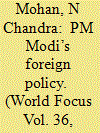

|
|
|
|
|
| Summary/Abstract |
Prime Minister Narendra Modi’s foreign policy has been credited with more achievements than the NDA government’s policies to turnaround the Indian economy. What is so distinctive about his foreign policy? Has he blazed a different trail from his predecessor, Dr Manmohan Singh? Economic diplomacy is a forte they have in common. Both enjoy their foreign travels. During his first year in office, PM Modi visited 17 countries and spent 53 days abroad. This is not very different from Dr Singh’s frequent flyer miles during UPA-11 when he visited 12 countries and spent 47 days outside
|
|
|
|
|
|
|
|
|
|
|
|
|
|
|
|
| 2 |
ID:
065116
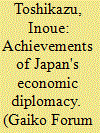

|
|
|
| 3 |
ID:
088126
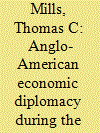

|
|
|
|
|
| Publication |
2009.
|
| Summary/Abstract |
Throughout the Second World War British and American companies competed to gain the contract for the electrification of the central Brazilian railway. The British Foreign Office used this case to establish a broader principle with the U.S. government that the conditions brought about by war would not be used by one country to gain commercial advantage at the expense of the other. While the U.S. government supported this principle in theory, this article argues that they failed to adhere to it in practice. U.S. actions in this case shed new light on the country's economic diplomacy with Britain during the Second World War.
|
|
|
|
|
|
|
|
|
|
|
|
|
|
|
|
| 4 |
ID:
113916


|
|
|
|
|
| Publication |
2012.
|
| Summary/Abstract |
Bangladesh has achieved some impressive social and developmental goals in its health and education sectors. It has also effectively dealt with the adversities caused by the downturn of the global economy, and focused on strengthening its military capabilities to protect its national interests. However, environmental issues, growing international scrutiny about a fair war crimes trial, human rights concerns, the India-Bangladesh border, and transit and water sharing arrangements remain key challenges.
|
|
|
|
|
|
|
|
|
|
|
|
|
|
|
|
| 5 |
ID:
130698
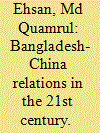

|
|
|
| 6 |
ID:
130610
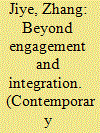

|
|
|
|
|
| Publication |
2014.
|
| Summary/Abstract |
As part of its new strategy of "retuming to the Asia-Pacific region", the A Obama administration has adopted some tough economic policies towards China, notably promoting the Trans-Paci?c Partnership (TPP) and attempting to establish new rules of international trade and investment aimed at strengthening economic ties with other Western countries through the Trans-Atlantic Trade and Investment Partnership Agreement(TTlP ), both of which tend to compress the geopolitical space for China's economic rise. The administration is also using a 'green barrier' to suppress the development of China's high-tech industry, and using economic diplomacy and investment restrictions against Chinese state-owned enterprises. This paper seeks to examine and analyze the causes of shifts in the U .S. economic strategy towards China.
|
|
|
|
|
|
|
|
|
|
|
|
|
|
|
|
| 7 |
ID:
053792
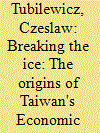

|
|
|
| 8 |
ID:
117814
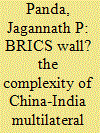

|
|
|
| 9 |
ID:
072231
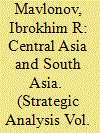

|
|
|
| 10 |
ID:
164418
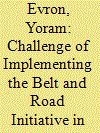

|
|
|
|
|
| Summary/Abstract |
Sceptics query China's economic and political ability to realize its Belt and Road Initiative (BRI). Less attention has been paid to BRI's implications for one of the defining features of China's foreign policy: low engagement in areas beyond its traditional sphere of influence. The Middle East is such a case. Addressing this issue, the article explores the mutual impact of China's low political involvement in the Middle East and BRI's realization. Distinguishing cross-border connectivity projects from other BRI-associated activities, the article examines the challenges to executing BRI-related projects in Israel. It finds that realizing connectivity projects – the essence of the BRI vision – will require China to increase its regional engagement, a shift that it has so far avoided.
|
|
|
|
|
|
|
|
|
|
|
|
|
|
|
|
| 11 |
ID:
185662
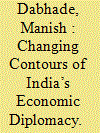

|
|
|
|
|
| Summary/Abstract |
This article explores India’s economic diplomacy since its early years of Independence, from the margins to a relative significance in the global economic hierarchy. It begins by identifying the constant, governing first principles and core objectives of India’s economic diplomacy that have remained constant over the years. The first three sections broadly embody the distinctive phases of India’s economic diplomacy, each laced with turning points, challenges and shifts entailed therein. The article ends with a concluding section that provides an analysis of India’s economic diplomacy in terms of broader trends, current challenges and the road ahead in the policy-relevant future.
|
|
|
|
|
|
|
|
|
|
|
|
|
|
|
|
| 12 |
ID:
178215
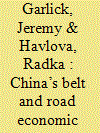

|
|
|
|
|
| Summary/Abstract |
Drawing on the literature on strategic hedging and adapting it to China’s use of economic diplomacy in the service of comprehensive national security goals within the regionalised foreign policy approach of the Belt and Road Initiative (BRI), we examine China’s approach to securing and expanding its interests in the Persian Gulf. To implement the trade and infrastructure connectivity goals of the BRI and to secure the continued flow of diversified energy supplies, China needs to boost relations with both regional powerhouses, Iran and Saudi Arabia, without alienating either of them or the regional hegemon, the United States. The resulting strategy of strategic hedging is based in the Chinese approach to economic diplomacy, which utilises Chinese commercial actors in the service of national strategic objectives. Relations require careful and ongoing management if China is to achieve outcomes which benefit all sides while avoiding becoming entangled in the region’s intractable geopolitical problems.
|
|
|
|
|
|
|
|
|
|
|
|
|
|
|
|
| 13 |
ID:
163713
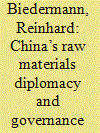

|
|
|
|
|
| Summary/Abstract |
China’s raw materials diplomacy and unregulated purchasing of minerals in Africa and Latin America, as well as its domestic raw materials export quota, have for years been eyed with suspicion by state and private actors. Industrialized countries want to uphold and extend free market access to raw materials, but also strengthen their political accountability and sustainability. However, critics argue that in contrast, China, the world’s largest metals and minerals trading power, has taken the opposite course, ignoring social and environmental standards, reinforcing authoritarian governments, and erecting trade barriers. China is faced with several interrelated challenges in its resource diplomacy and governance. This article claims that an identifiable, chronological connection and pattern has existed between China’s aid and investment diplomacy for resources since the late 1990s, free trade agreements since the 2000s, Beijing’s resource nationalism since the 2010s, and the reform process of national and privately organized transnational governance toward sustainability in the present day. Is China socializing with emerging transnational standards on mining and resource extraction in the developing world, and if so, why? This article argues that China’s raw materials governance, including corporate governance, has entered a phase of reform to pacify the external environment and to implement the Belt and Road Initiative. In theoretical terms, China’s raw materials governance will continue to emphasize neoliberal and neo-mercantilist goals, cushioned by globalist features.
|
|
|
|
|
|
|
|
|
|
|
|
|
|
|
|
| 14 |
ID:
186118
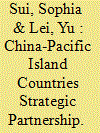

|
|
|
|
|
| Summary/Abstract |
China’s vigorous involvement in the Pacific Island countries (PICs) is often surmised by scholars of international relations (Wesley-Smith 1; Pryke 2) to be primarily motivated by geopolitical calculations. This paper argues that China’s increasing presence in the Pacific Islands indeed helps China create a “sphere of influence,” but such geopolitical dynamics are characterized not merely by China’s response to its perceived containment imposed by the USA and its allies in the region, but also by China’s willingness to engage with PICs on its own terms. This is reflected in China’s multifaceted approaches to offering economic assistance and expanding its economic and political presence in the region. China has increasingly cemented its strategic partnership with PICs by pursuing its traditional strategy of “non-interference” that satisfies PICs’ demands for political independence and self-determination. China reaps not only economic but also geopolitical benefits from its intensified economic, and by extension, political, and strategic partnership with PICs, thus assisting its rise at the systemic (global) level. This paper examines the rationale behind China’s economic and political approaches to the region and evaluates its promises and pitfalls as regional power dynamics continues to evolve.
|
|
|
|
|
|
|
|
|
|
|
|
|
|
|
|
| 15 |
ID:
163379
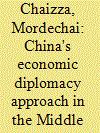

|
|
|
|
|
| Summary/Abstract |
This study analyses China’s economic diplomacy approach in the Middle East conflicts in order to explore the following question: How does China use diplomatic means to protect and pursue commercial investments, economic assets, and economic tools, and to advance its foreign policy goals in the Middle East conflict zones? This study argues that despite its adherence to the principle of non-intervention, Beijing’s economic diplomacy has a more flexible and pragmatic interpretive approach. Chinese economic diplomacy in the Middle East uses its diplomatic resources to intervene as needed to safeguard its investments and assets, and utilises economic incentives to promote its well-defined foreign policy goals in the region’s hotspots.
|
|
|
|
|
|
|
|
|
|
|
|
|
|
|
|
| 16 |
ID:
139781
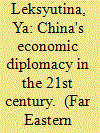

|
|
|
|
|
| Summary/Abstract |
The author takes on China's economic diplomacy, a key area of that country's foreign policy in the 21st century that includes economic rewards and coercion. She addresses, in particular, the measures Beijing is taking to make other countries heavily dependent on China. The author also discusses the significance of aid China offers in an effort to advance its foreign policy goals.
|
|
|
|
|
|
|
|
|
|
|
|
|
|
|
|
| 17 |
ID:
140487
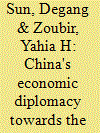

|
|
|
|
|
| Summary/Abstract |
Since the outbreak of the Arab revolts in late 2010, China has adhered to its ‘business-first’ economic diplomacy towards the Arab countries, a policy driven by China's ongoing geoeconomic interests. The ten-year-old China–Arab States Cooperation Forum serves as the nucleus for China's economic diplomacy in the region. The Chinese authorities have also initiated interagency coordination and central–local governments' power sharing in order to pursue this diplomacy successfully. However, while its economic diplomacy may be evolving, China, unlike what it has achieved in Black Africa, seems to have failed to develop strategic, political and cultural exchanges with its Arab counterparts. The intertwined geopolitical and geoeconomic factors that have emerged since the Arab revolts might make it harder for China to reap economic benefits while shelving political entanglement to sustain this economic diplomacy in the longer run.
|
|
|
|
|
|
|
|
|
|
|
|
|
|
|
|
| 18 |
ID:
116492
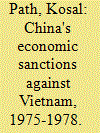

|
|
|
|
|
| Publication |
2012.
|
| Summary/Abstract |
This article carries a two-fold argument. First, Beijing's economic sanctions against Vietnam during the period 1975-1978 were mainly motivated by its desire to punish Vietnam for an anti-China policy that smacked of ingratitude for the latter's past assistance, fuelled further by Hanoi's closer relations with Moscow. They were also designed to extract Hanoi's accommodation of China's demand for territorial boundary concessions and to halt the persecution of ethnic Chinese residents in Vietnam. Second, the resultant meltdown of Sino-Vietnamese relations, as well as the making of the Soviet-Vietnamese alliance between 1975 and 1978, was gradual and contentious rather than swift and decisive as most existing studies contend. Hanoi's reluctance to forge a formal military alliance with the faraway Soviet Union against China was largely driven by the importance of China's remaining aid and economic potential to Vietnam's post-war economic reconstruction and the uncertainty of the Soviet commitment to aid Vietnam.
|
|
|
|
|
|
|
|
|
|
|
|
|
|
|
|
| 19 |
ID:
178218
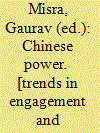

|
|
|
|
|
| Publication |
New Delhi, KW Publishers Pvt Ltd, 2021.
|
| Description |
xii, 243p.hbk
|
| Standard Number |
9789389137972
|
|
|
|
|
|
|
|
|
|
|
|
Copies: C:2/I:0,R:0,Q:0
Circulation
| Accession# | Call# | Current Location | Status | Policy | Location |
| 059999 | 327.51/MIS 059999 | Main | On Shelf | General | |
| 060000 | 327.51/MIS 060000 | Main | On Shelf | General | |
|
|
|
|
| 20 |
ID:
142743
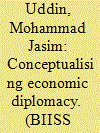

|
|
|
|
|
| Summary/Abstract |
Conceptualisation of economic diplomacy is not a straightforward task as its boundaries involve actors, issues and contents, instruments and levels of, and states (with/by) practicing economic diplomacy. Economic diplomacy concerns how a state undertakes its national policy, how it negotiates and works with different states on the policy at multiple levels and how interaction between the two is administered. Although non-state actors now-a-days are influential, states are central to economic diplomacy that refers to interactions on trade and economy at multiple levels. Thus, economic diplomacy is more than an approach or a model that promotes a state’s economic security. This paper substantiates the argument that responsibilities of actors, countries with whom actors are to negotiate, issues at various levels and instruments employed by actors to facilitate the issues in their favour are vital for a country’s economic diplomacy. Hence, the paper aims at offering a comprehensive summary of issues relevant to conceptualise economic diplomacy.
|
|
|
|
|
|
|
|
|
|
|
|
|
|
|
|
|
|
|
|
|